Library of Congress
Industrial Revolution
Could you live without your phone? What about cars, steel, or clothing? Class groups collaborate to produce presentations that argue that either the telephone, the gramophone, the automobile, the textile industry, or the steel industry...
Curated OER
"Sweet Clara and the Freedom Quilt" by Deborah Hopkinson
Students create paper quilts of their own using the isometric grid that tessellates the plane or the fraction quilt square.
Curated OER
Side by Side: Butterfly Wings and Symmetry
Students observe butterfly images and then draw and paint their own design. They use this activity to explain symmetry.
Curated OER
Calder's Balancing Acts
Students learn the vocabulary of contemporary sculpture and distinguish between abstract and realistic sculpture, mobile and stabile, biomorphic and geometric. They write equations using Calder's mobiles
Curated OER
Fractals, An Inquiry: Day 4
Students put their growing understanding of the scientific inquiry process to work. They use paint to implement their plans to experiment with how changing one aspect of the fractal making process influences their appearance.
Curated OER
Geo Jammin' By DeSign - Day 4, Lesson 22: Authentic Design
Learners explore the complexity of handmade quilts and their designs by looking a real life samples.
Curated OER
Geo Jammin' By DeSign - Day 3, Lesson 12: Jammin
Students review definitions of word wall words using songs, movement and sharing.
Curated OER
Geo Jammin' By DeSign - Day 6, Lesson 32: Appliqué-tion of Learning
Second graders hand stitch three different appliqué stitches using triangles as a motif.
Curated OER
Geo Jammin' By DeSign - Day 5, Lesson 28: The Mo-tea-if
Second graders explore tea dyeing cloth.
Curated OER
Geo Jammin' By DeSign - Day 7, Lesson 37: Summarizing for the Summative
Students listen for specific information during summary presentations. They practice giving feedback on given topic according to a set of standards. The speaker reports to the rest of class from a report and listeners determine if...
Curated OER
Native American Living Museum
Seventh graders complete a unit of lessons on Native Americans. They analyze Native American cultures, create a Native American artifact for a Living Museum, and develop a tour of the museum using a digital camera and a Powerpoint...
Curated OER
Weather/Climate
Pupils examine traditional Native American weather/climate knowledge. They keep a weather journal and research cloud cover.
Curated OER
Hello Mexico City
Students research and explain the functions, characteristics, and cultural aspects of Mexico City and analyze how they have affected development and settlement. Students work in groups to gather information and report back to the class.
Curated OER
Volatile Volcanoes
Students have fun with graphics, graphs and money, simultaneously learning with up-to-the-minute information.
Curated OER
Dysfunctional Eating
Sixth graders write a 1.5 page paper explaining how to make their favorite nutritional snack. They need to assume that the audience has never seen or heard of the snack before.
Curated OER
From Lake to Lake
Fourth graders investigate the formation of the Great Salt Lake. They conduct research using a variety of resources. The information is used to construct a timeline of the history. Each phase of history should include facts and...
Other
Bedford Bytes: Mother Nature
This is a selection of three image galleries to be used in conjunction with drawing classes that study patterns in nature.
ClassFlow
Class Flow: Patterns in Nature
[Free Registration/Login Required] This flipchart shows some of Sir Robert Hitcham's amazing collection of photographs that are on his website. It will stimulate discussion about art in nature.
Cornell University
Cornell University: Art, Design, and Visual Thinking
Use the left-hand toolbar of this site to investigate an online textbook for the language of design. It provides visual examples and explanations of line, form, color, color psychology, texture, balance, proportion and many more...
Shodor Education Foundation
Shodor Interactivate: Lesson: Visual Patterns in Tessellations
This upper elementary and middle school lesson plan examines the mathematical nature of art, tilings and tessellations. Students will also explore polygons, symmetry, analyze patterns and explore the role of mathematics in nature and our...
Houghton Mifflin Harcourt
Houghton Mifflin Harcourt: Saxon Activity Center Real World Investigation: Symmetry Around Us [Pdf]
Use this internet lesson to explore different types of symmetry in nature. Learners examine line symmetry, rotational symmetry, and bilateral symmetry. An integrated math, language art, and art lesson. Acrobat Reader required.
Annenberg Foundation
Annenberg Learner: Part C: Fibonacci Numbers
Look at an interesting application of ratios that demonstrates the amazing patterns that emerge when we examine mathematics. The Fibonacci numbers are found in art, music, and nature.
PBS
Pbs Learning Media: Everyday Learning
Learning does not take place only in the classroom. Learning occurs naturally, every day! This KET collection uses original animation and wonderful, visual images to introduce basic concepts of math, science, social studies, art, and...



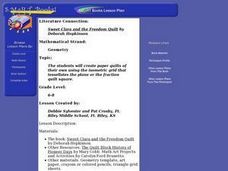


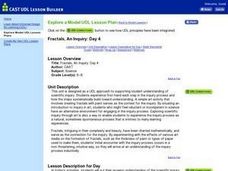
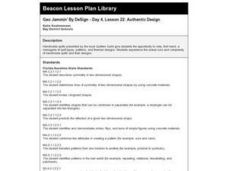
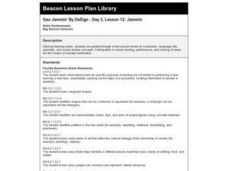



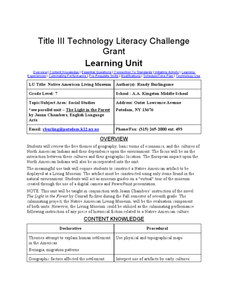
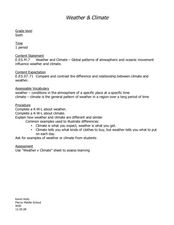

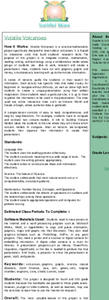






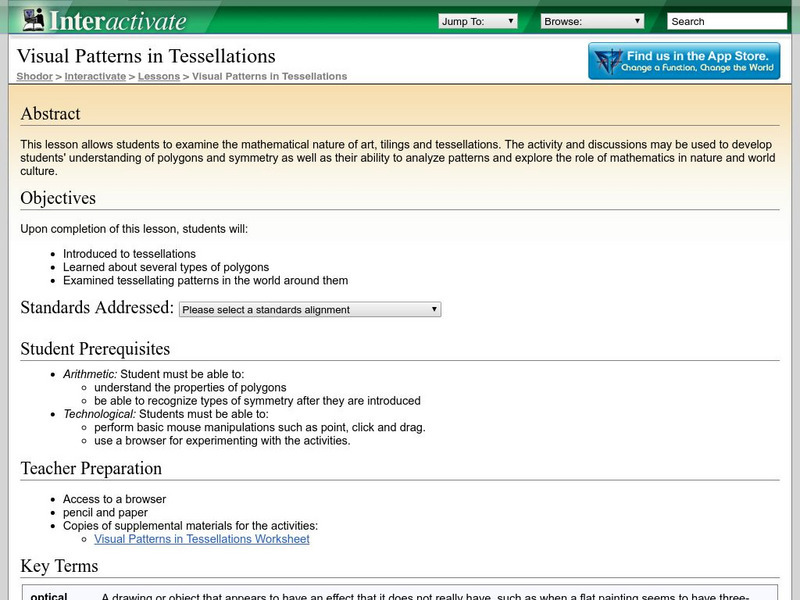
![Houghton Mifflin Harcourt: Saxon Activity Center Real World Investigation: Symmetry Around Us [Pdf] Activity Houghton Mifflin Harcourt: Saxon Activity Center Real World Investigation: Symmetry Around Us [Pdf] Activity](https://d15y2dacu3jp90.cloudfront.net/images/attachment_defaults/resource/large/FPO-knovation.png)
